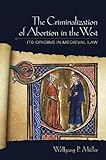The Criminalization of Abortion in the West : Its Origins in Medieval Law / Wolfgang P. Müller.
Material type: TextPublisher: Ithaca, NY : Cornell University Press, [2012]Copyright date: ©2017Description: 1 online resource (280 p.) : 1 chart/graphContent type:
TextPublisher: Ithaca, NY : Cornell University Press, [2012]Copyright date: ©2017Description: 1 online resource (280 p.) : 1 chart/graphContent type: - 9780801464157
- Abortion -- Law and legislation -- Europe, Western
- Abortion -- Law and legislation -- History
- Abortion -- Law and legislation -- Europe, Western
- Law, Medieval -- Europe, Western
- Law, Medieval
- Family & Relationships
- Legal History & Studies
- Medieval & Renaissance Studies
- HISTORY / Medieval
- abortion, criminalization of abortion, history of abortion, Western legal tradition, Western jurisprudence, medieval law, medieval criminal justice, treatment of abortion in medieval Europe, abortion as a public crime, legal history, moral theology, literature
- 345/.02850940902 23/eng/20230216
- online - DeGruyter
| Item type | Current library | Call number | URL | Status | Notes | Barcode | |
|---|---|---|---|---|---|---|---|
 eBook
eBook
|
Biblioteca "Angelicum" Pont. Univ. S.Tommaso d'Aquino Nuvola online | online - DeGruyter (Browse shelf(Opens below)) | Online access | Not for loan (Accesso limitato) | Accesso per gli utenti autorizzati / Access for authorized users | (dgr)9780801464157 |
Frontmatter -- Contents -- Acknowledgments -- Abbreviations -- Introduction -- 1. The Earliest Proponents of Criminalization -- 2. Early Venues of Criminalization -- 3. Chief Agents of Criminalization -- 4. Principal Arguments in Favor of Criminalization -- 5. Objections to Criminalization -- 6. Abortion Experts and Expertise -- 7. Abortion in the Criminal Courts of the Ius Commune -- 8. Forms of Punishment in the Criminal Courts of the Ius Commune -- 9. The Frequency of Criminal Prosecutions -- Bibliography -- Index
restricted access online access with authorization star
http://purl.org/coar/access_right/c_16ec
Anyone who wants to understand how abortion has been treated historically in the western legal tradition must first come to terms with two quite different but interrelated historical trajectories. On one hand, there is the ancient Judeo-Christian condemnation of prenatal homicide as a wrong warranting retribution; on the other, there is the juristic definition of "crime" in the modern sense of the word, which distinguished the term sharply from "sin" and "tort" and was tied to the rise of Western jurisprudence. To find the act of abortion first identified as a crime in the West, one has to go back to the twelfth century, to the schools of ecclesiastical and Roman law in medieval Europe.In this book, Wolfgang P. Müller tells the story of how abortion came to be criminalized in the West. As he shows, criminalization as a distinct phenomenon and abortion as a self-standing criminal category developed in tandem with each other, first being formulated coherently in the twelfth century at schools of law and theology in Bologna and Paris. Over the ensuing centuries, medieval prosecutors struggled to widen the range of criminal cases involving women accused of ending their unwanted pregnancies. In the process, punishment for abortion went from the realm of carefully crafted rhetoric by ecclesiastical authorities to eventual implementation in practice by clerical and lay judges across Latin Christendom. Informed by legal history, moral theology, literature, and the history of medicine, Müller's book is written with the concerns of modern readers in mind, thus bridging the gap that might otherwise divide modern and medieval sensibilities.
Mode of access: Internet via World Wide Web.
In English.
Description based on online resource; title from PDF title page (publisher's Web site, viewed 26. Apr 2024)


